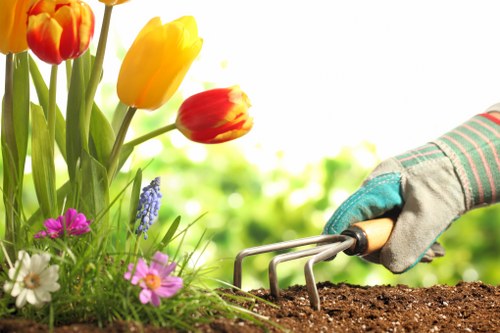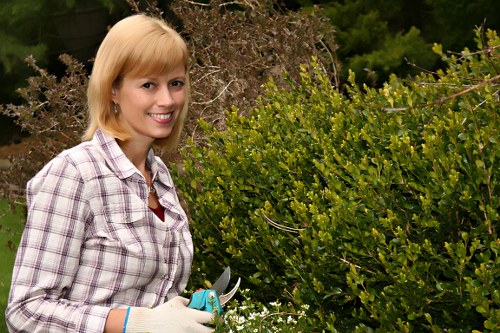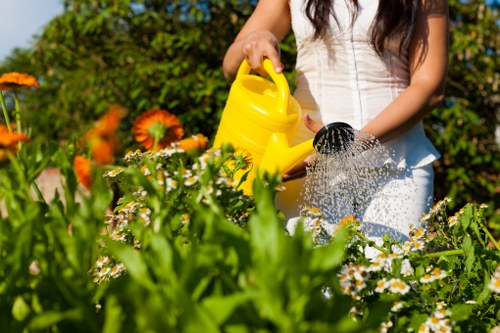Comprehensive Guide to Garden Maintenance in Mitcham

Introduction to Garden Maintenance
Maintaining a beautiful garden in Mitcham requires dedication, knowledge, and the right set of tools. Whether you're a seasoned gardener or a beginner, understanding the essentials of garden upkeep can transform your outdoor space into a vibrant and thriving haven.
In this article, we'll explore various aspects of garden maintenance specific to the Mitcham area, including climate considerations, soil health, plant selection, and seasonal care. By following these guidelines, you'll ensure your garden remains healthy, attractive, and sustainable throughout the year.
Let's dive into the key components of effective garden maintenance that can help you achieve the garden of your dreams in Mitcham.

Climate and Its Impact on Garden Maintenance
Understanding Mitcham's Climate
Mitcham experiences a temperate climate, characterized by moderate temperatures and adequate rainfall. This climate is conducive to a wide variety of plants, but it's essential to understand the specific weather patterns to optimize your garden's health.
Temperature Fluctuations
The region experiences seasonal temperature changes, with warm summers and cool winters. These fluctuations impact plant growth cycles and maintenance schedules.
Rainfall Patterns
Consistent rainfall supports lush vegetation, but excessive rain can lead to waterlogging and plant diseases. Implementing proper drainage solutions is crucial to maintaining garden health.

Soil Health and Preparation
Testing Soil Quality
Healthy soil is the foundation of a thriving garden. Conducting a soil test helps determine pH levels, nutrient content, and soil composition, enabling you to make informed decisions about amendments and fertilizers.
Improving Soil Structure
Incorporate organic matter such as compost or manure to enhance soil texture, promote aeration, and retain moisture.
Mulching Techniques
Applying mulch helps regulate soil temperature, conserve moisture, and suppress weed growth, contributing to a more manageable and productive garden.

Plant Selection and Care
Choosing the Right Plants
Selecting plants that are well-suited to Mitcham's climate ensures better growth and reduces maintenance efforts. Consider native species and those adapted to local conditions.
Annual vs. Perennial Plants
Understanding the difference between annual and perennial plants helps in planning seasonal plantings and ensuring continuous garden interest throughout the year.
Pruning and Trimming
Regular pruning encourages healthy growth, removes dead or diseased branches, and maintains the desired shape and size of your plants.

Seasonal Garden Maintenance
Spring Maintenance Tips
Spring is a critical time for garden preparation. Focus on planting new seeds, fertilizing, and addressing any winter damage to get your garden off to a strong start.
Summer Care Strategies
During the warmer months, prioritize watering, pest control, and weeding to maintain plant health and vitality.
Autumn Cleanup
As temperatures drop, prepare your garden for winter by clearing fallen leaves, dividing perennials, and protecting sensitive plants from frost.

Tools and Equipment for Effective Maintenance
- Pruning Shears: Essential for trimming and shaping plants.
- Lawn Mower: Keeps your grass neat and well-maintained.
- Garden Fork: Useful for loosening soil and aerating beds.
- Hose and Irrigation Systems: Ensure consistent watering of your plants.
Investing in quality gardening tools can make maintenance tasks easier and more efficient, ultimately enhancing the overall health and appearance of your garden.
Having the right tools at your disposal can significantly reduce the time and effort required for garden maintenance.
Ensure your garden toolkit is well-stocked with these essentials to tackle any maintenance challenge effectively.

Pest and Disease Management
Identifying Common Pests
Understanding the common pests that affect gardens in Mitcham allows for timely intervention and prevention. Regular monitoring helps in early detection and control.
Natural Pest Control Methods
Employing natural remedies such as introducing beneficial insects or using organic sprays can effectively manage pest populations without harming the environment.
Disease Prevention Techniques
Maintaining plant health through proper watering, pruning, and soil management reduces the risk of diseases that can compromise your garden's integrity.

Watering and Irrigation Best Practices
Efficient Watering Techniques
Proper watering is critical for plant health. Implementing techniques like drip irrigation or soaker hoses ensures water is delivered directly to the roots, minimizing waste.
Scheduling Your Watering Routine
Adjust your watering schedule based on seasonal changes and specific plant needs to maintain optimal moisture levels in the soil.
Conserving Water in Your Garden
Adopting water-saving practices not only benefits the environment but also reduces your water bills. Consider rainwater harvesting systems or mulching to retain soil moisture.

Lawn Care and Maintenance
Grass Selection
Selecting the right type of grass for Mitcham's climate ensures a lush and resilient lawn. Consider factors like sunlight, soil type, and usage when choosing your grass variety.
Mowing Techniques
Proper mowing practices, including correct blade height and mowing frequency, promote healthy grass growth and prevent weed proliferation.
Fertilizing Your Lawn
Regular fertilization provides essential nutrients that strengthen grass blades and improve overall lawn health.

Enhancing Garden Aesthetics
Landscape Design Principles
Incorporating design elements like pathways, borders, and focal points can enhance the visual appeal of your garden, making it a more enjoyable space.
Seasonal Flower Beds
Planting a variety of flowers that bloom in different seasons ensures continuous color and interest throughout the year.
Use of Decorative Elements
Adding features such as garden ornaments, lighting, and water features can create a more inviting and picturesque environment.

Sustainable Gardening Practices
Composting
Creating a compost pile reduces waste and provides rich organic material that enhances soil fertility.
Rainwater Harvesting
Collecting rainwater for garden use conserves water and supports sustainable gardening practices.
Native Plant Integration
Using native plants promotes biodiversity and requires less maintenance, as they are naturally adapted to the local environment.

Hiring Professional Garden Maintenance Services
Benefits of Professional Help
Hiring experts in garden maintenance ensures that your garden receives the attention and care it needs, leveraging professional knowledge and experience.
Choosing the Right Service
Look for reputable garden maintenance companies in Mitcham that offer a range of services tailored to your specific needs.
Cost Considerations
Investing in professional maintenance can save you time and effort, providing long-term benefits for your garden's health and beauty.

DIY Garden Maintenance Tips
Regular Inspection
Consistently monitoring your garden for signs of pests, diseases, or nutrient deficiencies allows for prompt and effective intervention.
Effective Weeding
Removing weeds regularly prevents them from competing with your plants for resources, ensuring better growth and productivity.
Proper Tool Maintenance
Keeping your gardening tools clean and well-maintained extends their lifespan and ensures they perform optimally.

Year-Round Garden Maintenance Schedule
- Spring: Planting, fertilizing, and pruning.
- Summer: Watering, pest control, and weeding.
- Autumn: Leaf removal, soil preparation, and planting bulbs.
- Winter: Tool maintenance, planning, and protecting plants.
Following a structured maintenance schedule helps in managing tasks efficiently and keeps your garden in optimal condition throughout the year.
Stay organized with a seasonal plan to ensure all maintenance tasks are timely and effectively completed.
Implementing a year-round schedule can significantly enhance the health and appearance of your garden.

Conclusion
Effective garden maintenance in Mitcham involves a combination of understanding the local climate, ensuring soil health, selecting the right plants, and adhering to seasonal care routines. Whether you choose to maintain your garden yourself or hire professionals, the key is consistency and attention to detail.
By following the tips and strategies outlined in this guide, you can achieve a beautiful, sustainable, and thriving garden that enhances your home's aesthetic and provides a peaceful outdoor retreat.
Ready to transform your garden into a stunning masterpiece? Contact us today to book your garden maintenance service and take the first step towards a lush and vibrant outdoor space.